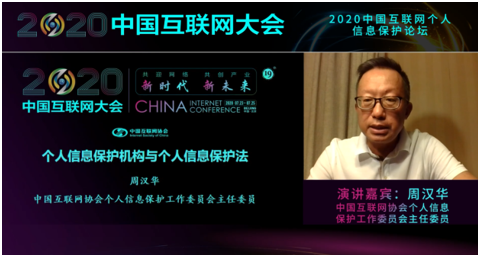
The 19th China Internet Conference (CIC), sponsored by the Internet Society of China (ISC), opened on the afternoon of July 25, 2020. At the conference, which was held online, Professor Zhou Hanhua, Chairman of the Working Committee on Private Information Protection of ISC and Deputy Director of CASS Law Institute, gave a keynote speech entitled Personal Information Protection Organs and the Personal Information Protection Law at the “Personal Information Protection” forum of the conference.
In the speech, Professor Zhou pointed out that the Personal Information Protection Law, which has been the focus of public attention for some years, would be adopted soon. The current exposure draft of the law provides the principle of establishingspecial protection of personal informationorgansto be responsible for the related supervision and law enforcement work, which embodies advanced ideas and principles of institutional design. However, there are still some vague pointsin the overall architectural design of the law that need to be further clarified. In the future setup of personal information protection organs, the independency of such organs must be emphasized.A three-level (namely national, provincial and prefectural levels) horizontal personal information protection management framework should be established to shift the focus of work downward to the lower levels. Meanwhile, a semi-vertical management system below the provincial level should be implemented to prevention interference in law enforcement by local governments. An apparent problem in the current personal information protection management pattern is the vague boundary of law enforcement responsibility, which can easily lead to the phenomenon of buck-passing. China should scientifically define the boundary between violations of administrative law and criminal acts and appropriately raise the threshed of the constitution of relevant crimes. Meanwhile, it should clearly define the scope and boundary of law enforcement carried out by personal information protection organs, and create a mechanism for establishing a smooth linkage between administrative law enforcement and criminal law enforcement.



